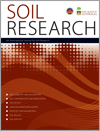Designing a post-mining landscape without considering the evolution of surface materials and pedogenesis assumes that any materials are in an equilibrium state. Here, the effect of depth-dependent pedogenesis functions and particle breakage geometry on erosion rates and landform evolution are examined using the SSSPAM Landscape Evolution Model. The results demonstrate that with knowledge of weathering and pedogenesis, an optimised landscape can be engineered that would reduce the cost of post-mining landform design and construction.
SR24230 Abstract | SR24230 Full Text | SR24230PDF (5.3 MB) Open Access Article






